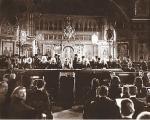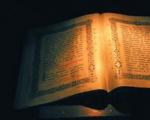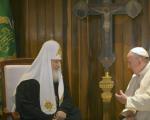Archpriest Nikolai Mezentsev. Hieromartyr Nicholas of Mezentsev, presbyter of the Hieromartyr Archpriest Nicholas
Archpriest Nikolai Mezentsev (1863–1938) was born in the village of Krasnaya Slobodka, Trubchevsky district, Oryol province, into a poor family of a psalm-reader. Having been orphaned early, he received his religious education at government expense. In 1891 he came to Simferopol and was accepted as a teacher at the Taurida Theological Seminary. In 1903, Father Nikolai became rector of the Church of the Nativity of the Virgin Mary at the Taranov Belozerov hospital and remained so until his arrest in 1923.
The establishment of Soviet power entailed many tragic events, both in the personal and church life of Father Nicholas. His eldest son Sergei Nikolaevich - an officer of the Volunteer Army - hid for some time in Simferopol, then went to Sevastopol, where he was arrested and shot. In 1922, a campaign began to confiscate church valuables to combat famine in Crimea. Father Nikolai tried to preserve the silver utensils and vessels necessary for performing divine services, the icon of the Tikhvin Mother of God, donated during the establishment of the hospital, and the icons left by parishioners in the church for safekeeping. A meeting of parishioners decided to give scrap silver and eight vestments from icons to help the starving people. But it seemed to the authorities that the priest was hiding enormous church wealth, so Father Nikolai was arrested. He was charged with theft, concealment and careless storage of church bone prices, as well as resisting their removal. Archpriest Nikolai Mezentsev was sentenced to three years in concentration camps and sent to a Nizhny Novgorod prison, from where he was released early ten months later.
Upon returning to Simferopol, Father Nikolai served in the Peter and Paul Cathedral, then moved to the Holy Trinity Greek Church, which later became the cathedral. The Holy Trinity Church was closed in February 1933, Father Nicholas was arrested again, accused of hiding the valuables of the now Peter and Paul Cathedral. He spent several months in prison, paid a fine of 640 rubles, after which he was released.
Meanwhile, the Holy Trinity Church has already begun to be rebuilt as a boarding school for children. The Greek community, led by Anastas Ksenitopoulo, came to his defense. The parishioners sent a petition to the Greek mission in Moscow. Previously, on the advice and blessing of Father Nicholas, they turned to the Greek consul, with the help of whom the community managed to defend the ringing of the bells. The authorities had to return the temple to the believers in 1934, because most of the community members were Greek subjects, so they had to treat them correctly. The rector of the temple was Father Mitrofan Vasilkioti. An 85-year-old elder, he performed liturgies, but he no longer had the strength to go outside the church yard. Father Nikolai was forbidden to perform services, but he helped the elderly abbot perform religious services and services, read and sing in the choir.
On December 15, 1937, Archpriest Nikolai Mezentsev was arrested for the last time, accused of helping his son, a white officer, hide from Soviet power, taking an active part in the return of the Holy Trinity Church and, “being aware of the activities of the counter-revolutionary Greek nationalist organization, hid it from the Soviet authorities.” Father Nikolai this time did not plead guilty, despite his advanced age and illness, he behaved courageously, maintained peace of mind and remained faithful to Christ and His Holy Church. On February 4, 1938, priest Nikolai Dmitrievich Mezentsev was sentenced to death.
His passion for music helped Nikolai get closer to the family of the famous Archpriest Mikhail Markov in Crimea, and he soon married his daughter, the girl Elizabeth. Subsequently, they had four children: Sergei, Anna, Olga, Mikhail.
In the year he was arrested on charges of allegedly concealing valuables that belonged to the Peter and Paul Cathedral. The priest spent several months in prison under investigation and was sentenced to a fine of 640 rubles.
In February 1933, the Holy Trinity Church was closed and they began to rebuild it into a boarding school for children. But the community decided to fight by all possible means to defend its rights. Since there were many Greek citizens among the parishioners, they turned to the Greek Mission in Moscow, in which Father Nikolai actively helped them, drawing up petitions to official institutions and advising them on what to do in certain cases. This time the authorities gave in, and the Holy Trinity Church was reopened this year. A Greek priest, who was then eighty-five years old, was appointed its rector, and although he could still perform the liturgy, due to weakness he no longer left the church yard. Archpriest Nikolai was appointed as an assistant to the elderly priest; he performed services, served, read and sang in the choir. In 1934, the authorities forbade Father Nicholas to serve; he was forced to go into retirement, but continued to help the elderly abbot.
On December 15 of the year, Archpriest Nikolai was arrested on charges that “after the closure of the temple, he took an active part in its return and thereby incited the population against the Soviet government.” And,"being aware of the activities of the counter-revolutionary Greek nationalist organization, he hid this from the Soviet authorities." On the same day, the entire church twenty were arrested. All of them were accused of counter-revolutionary activities for their connection with the Greek consulate in Moscow.
Father Nicholas was again accused of concealing church values; that he helped his son, a white officer, hide from Soviet power. During interrogations, Father Nikolai never wavered, did not succumb to the investigator’s pressure, and was courageous and laconic in his answers. Neither threats and assault, nor age and illness broke him. The priest did not plead guilty this time either. Two false witnesses were called - one was a cellmate of the priest, and the other was a member of the church twenty. They signed the protocols with the testimony necessary to convict the priest.
On February 14 of the year, a troika under the NKVD of the Crimean Autonomous Soviet Socialist Republic sentenced Archpriest Nicholas to death, the sentence was carried out in Simferopol. Along with him, five members of the Greek church community were shot.
In the year prot. Nikolai Mezentsev was canonized as a locally revered saint of the Crimean diocese by the determination of the Holy Synod of the Ukrainian Orthodox Church. In August
PSTGU DB
According to the abbot. Damascene (Orlovsky)
- Date of Birth: September 8, 1862
- Place of Birth: Oryol province, Trubchevsky district, village. Krasnaya Sloboda (Slobodka?)
- Floor: man
- Profession/place of work: priest, archpriest
- A place of death: Crimean ASSR, Simferopol
- Where and by whom was he arrested?
- Date of arrest: December 4, 1920
- Charges: "resistance to the seizure of church valuables; theft and concealment of them; careless storage; simulation of theft of valuables; conducting passive defense against seizure"
- Condemnation: December 1, 1922
- Judging authority: Supreme Revolutionary Tribunal under the Crimean Central Executive Committee
- Sentence: 3 years of concentration camps
- Place of departure: Nizhny Novgorod, city prison (12.1922-1923)
- Where and by whom was he arrested? Tauride province, Simferopol
- Date of arrest: February 1933
- Charge: "hiding church values"
- Place of departure: Tauride province, Simferopol, city prison (02.1933-1933)
- Where and by whom was he arrested? Tauride province, Simferopol
- Date of arrest: December 15, 1937
- Accusation: “being aware of the activities of the counter-revolutionary Greek nationalist organization, he hid this from the Soviet authorities”
- Condemnation: February 14, 1938
- Judging authority: troika under the NKVD of the Crimean Autonomous Soviet Socialist Republic
- Article: 58-6,58-11 Criminal Code of the RSFSR
- Sentence: capital punishment - execution
- Place of departure: Tauride province, Simferopol, city prison (12/15/1937-1938)
- Data sources: DB “New Martyrs and Confessors of the Russian Orthodox Church of the 20th Century”
Ordination
priest
01/16/1892
Place Tauride province, Simferopol
Who ordained Bishop Martinian (Muratovsky)
Service
Tauride Province, Simferopol, Tauride Theological Seminary
Job title church singing teacher
1891-1892
His passion for music helped Nikolai get closer to the family of a famous archpriest in Crimea
Mikhail Markov and soon he married his daughter, the girl Elizaveta. Subsequently
they had four children: Sergei, Anna, Olga, Mikhail
Tauride province, Simferopol, parochial school at the Tauride Theological Seminary
priest
Job title teacher of the Law of God and confessor of the Seminary
1892-1903
Alive and receptive, Fr. Nikolai managed to assimilate the knowledge and spiritual experience of Archpriest. Mikhail,
his father-in-law. O. Mikhail never grumbled in the face of insults and hardships, he remained silent and endured,
and this was a better example than any words and edifications for the young
Priest Nikolai Mezentsev. He felt in Fr. Michael his father and much more
I saw it with my eyes, I felt it with my heart. Their spiritual kinship was beyond doubt
and over time people began to notice how Fr. Nikolai becomes the successor of Archpriest. Mikhail.
At this time Fr. Nicholas works hard for the benefit of the Mother Church. Growing spiritually myself,
he acquired the Grace of God. Judicious and sober, he was appointed confessor
Seminaries. With the blessing of Bishop Fr. Nikolai was working on the issue of
establishment of a widow's house in the Tauride diocese, was a member of the audit committee
commission for the revision of deanery and monastic books, teacher of the law
women's Sunday school. Musical talent and relevant training
helped him organize church singing courses for teachers
parochial schools. He did all this for free.
In 1908 O. Nikolay received gratitude from the Simferopol charitable
society for the regular performance of evening services in the almshouse of the society and for
conducting public readings. Next year Fr. Nikolai was appointed a member of the commission
to oversee the construction of a new building for the seminary hospital, and in 1901.
participated in the construction of a new seminary church
Tauride province, Simferopol, Church of the Nativity of the Virgin Mary at the Taranov-Belozerov hospital
archpriest
Job title rector
1903-1922
Since 1910 - Treasurer of the Tauride Diocesan Trusteeship for the Spiritual Poor
ranks
Tauride province, Simferopol, V. A. Stanishevskaya women's gymnasium
archpriest
Job title teacher of the Law of God
Start date: 1903
Tauride province, Simferopol, Peter and Paul Cathedral
archpriest
Start date: 1923
When Fr. Nicholas returned from prison, the Church of the Nativity of the Virgin was closed,
and he began to serve in the Peter and Paul Cathedral. Later the cathedral became a refuge for renovationists,
which were headed by Metropolitan Alexy (Bazhenov). O. Nikolai moved to another church
Tauride province, Simferopol, Holy Trinity Greek Church (now Holy Trinity Cathedral)
archpriest
End date: 02.1933
Fr. Nicholas served in the church until its closure. By this time Fr. Nicholas has turned
71 years old. There are difficult years behind us: the shooting of a son, prison and nine arrests
Tauride province, Simferopol, Holy Trinity Greek Church
archpriest
1933-1937
In February 1933, the Holy Trinity Church was closed and began to be rebuilt
for a boarding school for children. But the community decided by all possible means
fight for your rights. Despite the terrible time of complete
legal lawlessness, the Orthodox managed to petition the Greek
mission in Moscow. Even earlier, on the advice of Fr. Nicholas turning to Greek
to the consul, they were able to defend the ringing of bells, which by that time was already prohibited.
It also helped that many members of the community were Greek subjects. O. Nikolay actively helped
the Greek community to fight for the temple - gave advice, drafted petitions to the authorities.
When the temple opened in 1934, Fr. Nikolai began to officially help the 85-year-old
to the rector Fr. Mitrofan Vasilkioti, took upon himself all the labor of service so that the temple
was not closed again. In 1934, the authorities banned Fr. Nikolai is forced to serve
was retired, but continued to help the elderly abbot.
In 1937 he was arrested - the authorities did not forgive him for his struggle for restoration
Greek temple
Publications
1. Donenko N. N., prot. Those who endured to the end: Priests of the Crimean diocese of the 30s. Simferopol, 1997.
pp. 48-54.
2. Act of the Jubilee Consecrated Bishops' Council of the Russian Orthodox Church on the conciliar glorification of the new martyrs and confessors of the Russian 20th century. Moscow, August 12-16, 2000
3. Donenko Nikolai, prot. Heirs of the Kingdom. Simferopol, 2004.
pp. 347-366.
- Russian empire
- Sergiev Primorskaya Hermitage
Danube Campaign
Defense of Sevastopol
Black River
Nikolay Vladimirovich Mezentsov(or Mezentsev, April 11 - August 4, St. Petersburg) - lieutenant general, adjutant general, chief of gendarmes and head of the Third Department (since 1876).
Biography
Origin and military service
He came from the noble family of Mezentsov - the youngest son of Vladimir Petrovich Mezentsov and Countess Vera Nikolaevna, née Zubova (1800-1863), daughter of the regicide Count N.A. Zubov and granddaughter of Generalissimo A.V. Suvorov. Nikolai's older brother, Mikhail, is a chamberlain.
He began his military service on October 3, 1845, with the rank of non-commissioned officer in the Preobrazhensky Life Guards Regiment. Two years later he received the officer rank of ensign. In 1849, he took part in a campaign to the western border of the Russian Empire, the cause of which was the revolution in Hungary, which was suppressed by Russia together with the Austrian Empire. At the end of the same year he was promoted to second lieutenant.
Nikolai Mezentsov died unmarried and childless. The funeral service was attended by Emperor Alexander II and Tsarevich Alexander Alexandrovich, ministers and senior dignitaries, and members of the diplomatic corps. Metropolitan Isidore served the requiem. The guard of honor included squadrons of the cavalry regiment, horse artillery, mounted gendarmes, guards gendarmes, and Cossacks. N.I. Mezentsov was buried in the family crypt in the Sergius Primorsky Hermitage.
The killer of N. I. Mezentsov - the future writer and publicist Sergei Kravchinsky - managed to flee abroad in the confusion, where he subsequently described his terrorist attack in the brochure “Death for Death” as revenge for the recent execution of the populist I. M. Kovalsky.
Personal life
Never married and had no children. His mistress was a famous courtesan
Hieromartyr Nicholas was born on September 8, 1863 in the village of Krasnaya Slobodka, Trubchevsky district, Oryol province, into the family of psalm-reader Dmitry Mezentsev. Nikolai lost his parents early: his mother died when he was five years old, and his father when he was twelve. As an orphan who had parents from the church clergy, he received his spiritual education at public expense, and then was appointed as a teacher at the Taurida Theological Seminary. Bishop of Tauride and Simferopol Martinian (Muratovsky) ordained Nikolai Dmitrievich as a priest and appointed him as confessor of the seminary. In 1903, Father Nikolai was transferred to the Church of the Nativity of the Virgin Mary at the Taranov-Belozerov hospital in Simferopol and appointed teacher of the law at the girls' gymnasium. He was subsequently elevated to the rank of archpriest.
In Simferopol, Father Nikolai met the revolution and the seizure of power by the atheist Bolsheviks, the rule of General Wrangel, the last battles between the whites and the reds and the departure of the Volunteer Army from Crimea. One of the priest’s sons was an officer in General Wrangel’s army, but after the evacuation of the troops he remained with a group of officers in Simferopol. Father Nikolai helped them hide with their spiritual daughter, who hid them in the attic of her house. After the departure of the White Army, mass arrests of the officers remaining in Crimea and extrajudicial reprisals against them began. The stay of white officers in Simferopol became unsafe not only for them, but also for those who gave them shelter, and they decided to make their way to Sevastopol, to the sea. Father Nikolai blessed them, and they said goodbye forever. Soon after arriving in Sevastopol, they were all arrested and shot.
In March 1922, the confiscation of church valuables from churches began throughout Russia. In many cases, it took place during a clash between members of Soviet commissions and believers. The Church of the Nativity of the Virgin Mary did not escape this either. During the seizure, one of the women sounded the alarm, the temple quickly filled with people, but this did not prevent the commission from completing the seizure. The priest, the psalm-reader and the woman who rang the bell were arrested.
From November 5 to December 1, 1922, an open trial was organized in Simferopol, in which Archbishop Nikodim (Krotkov) of Tauride and Simferopol and almost the entire clergy of the diocese were defendants. Among others, Father Nikolai Mezentsev was repressed, but when interrogated, he did not admit guilt.
Soviet authorities sentenced Archpriest Nicholas to three years in prison and sent him to prison in Nizhny Novgorod. Nine months later, all those convicted in this case were released early. Returning to Simferopol, Father Nikolai began to serve in the Peter and Paul Cathedral. Soon the Peter and Paul Cathedral was captured by renovationists, and it moved to serve in the Holy Trinity Greek Church in Simferopol.
In 1933, Archpriest Nikolai was again arrested on charges of allegedly concealing valuables that belonged to the Peter and Paul Cathedral. The 70-year-old priest spent several months in prison under investigation and was eventually sentenced to a fine. At this time, the Holy Trinity Church was closed, and the parishioners began to bother about its opening, and since there were many Greek citizens among them, they turned to the Greek Mission in Moscow, in which Father Nikolai actively helped them, drawing up petitions to official institutions and advising what to do in certain cases. This time the authorities gave in - they gave permission to open the temple, and in 1934 they began to serve in the Holy Trinity Church again. A Greek priest, who was then eighty-five years old, was appointed its rector, and although he could still perform the liturgy, due to weakness he no longer left the church yard. Archpriest Nikolai was appointed as an assistant to the elderly priest; he performed the services, served, read and sang in the choir.
On December 15, 1937, Archpriest Nikolai was arrested for the third time. This time, in addition to concealing church values, there was added an accusation of helping his son, a white officer, escape, and active assistance to the Greek community in its efforts to open the temple. By this, according to the authorities, he “incited the population against Soviet power” and, “being aware of the activities of the counter-revolutionary Greek nationalist organization, hid this from the Soviet government.”
Father Nikolai pleaded not guilty to counter-revolutionary activities. Two false witnesses were called - one was a cellmate of the priest, and the other was a member of the church twenty. They signed the protocols with the testimony necessary to convict the confessor. On February 14, 1938, the NKVD troika sentenced Archpriest Nikolai to death - and he was shot.
In 1998, Hieromartyr Nicholas was glorified by the Holy Synod of the Ukrainian Orthodox Church as a locally revered saint of the Crimean diocese. On August 13-16, 2000, the Council of Bishops of the Russian Orthodox Church included the name of the Hieromartyr Nicholas in the Council of Holy New Martyrs and Confessors of Russia.





